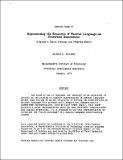| dc.contributor.author | Grossman, Richard W. | |
| dc.date.accessioned | 2008-04-10T14:54:08Z | |
| dc.date.available | 2008-04-10T14:54:08Z | |
| dc.date.issued | 1975-01 | |
| dc.identifier.uri | http://hdl.handle.net/1721.1/41122 | |
| dc.description | Work reported herein was conducted at the Artificial Intelligence Laboratory, a Massachusetts Institute of Technology research program supported in part by the Advanced Research Projects Agency of the Department of Defense and monitored by the Office of Naval Research under Contract Number N00014-70-A-0362-0003. | en |
| dc.description.abstract | The issue of how to represent the "meaning" of an utterance is central to the problem of computer understanding of natural language. Rather than relying on ad-hoc structures or forcing the complexities of natural language into mathematically elegant but computationally cumbersome representations (such as first-order logic), this paper presents a novel representation which has many desirable computational and logical properties. It is proposed to use this representation to structure the "world knowledge" of a natural-language understanding system. | en |
| dc.description.sponsorship | MIT Artificial Intelligence Laboratory | en |
| dc.language.iso | en_US | en |
| dc.publisher | MIT Artificial Intelligence Laboratory | en |
| dc.relation.ispartofseries | MIT Artificial Intelligence Laboratory Working Papers, WP-87 | en |
| dc.title | Representing the Semantics of Natural Language as Constraint Expressions | en |
| dc.type | Working Paper | en |
